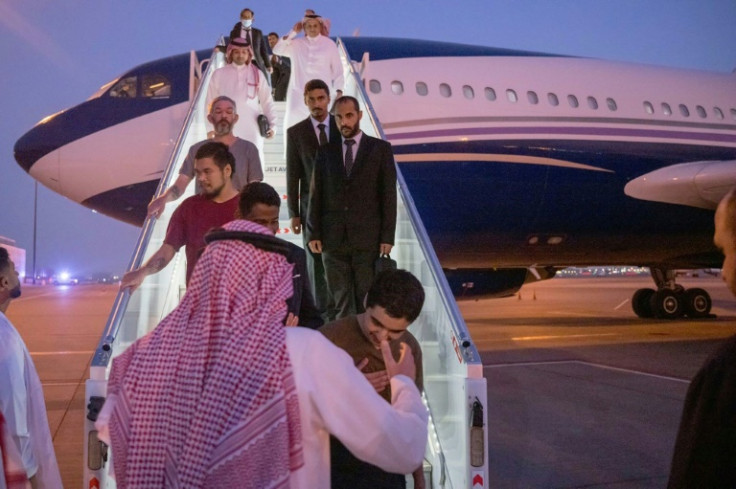2 Americans, 5 Brits Among POWs Transferred From Russia To Saudi

Ten prisoners of war from countries including the United States and Britain have been transferred to Saudi Arabia as part of an exchange between Russia and Ukraine, the Gulf state said Wednesday.
The group comprises five British nationals, two Americans and one each from Morocco, Sweden and Croatia, according to a Saudi official briefed on the operation.
The Saudi statement said they had arrived in the kingdom from Russia and that Saudi authorities were "facilitating procedures for their safe return to their respective countries".
British Prime Minister Liz Truss said on Twitter that the release of the Britons was "hugely welcome news... ending months of uncertainty and suffering for them and their families".
Truss said they had been "held by Russian-backed proxies in eastern Ukraine", and thanked both Ukrainian President Volodymyr Zelensky and Saudi Arabia for helping free them.
MP Robert Jenrick on Twitter identified one of the British detainees as "my constituent" Aiden Aslin, who had been sentenced to death in June as an alleged mercenary after being captured by pro-Russian separatists.
Jenrick said the British detainees were "on their way back to the UK" and that Aslin's family "could finally be at peace".
The Moroccan detainee is Brahim Saadoun, who was also sentenced to death in June by the unrecognised Donetsk People's Republic, according to a Moroccan official at the embassy in Riyadh.
Swedish Foreign Minister Ann Linde said on Twitter that the Swedish citizen, also held in Donetsk, "has now been exchanged and is well". She also thanked Ukraine and Saudi Arabia.
In Zagreb, the foreign ministry named the released Croat as Vjekoslav Prebeg, detained in April, and said he would return on Thursday, thanking Kyiv and Riyadh.
The releases came following efforts by Crown Prince Mohammed bin Salman, Saudi Arabia's de facto ruler, "in continuation of (his) commitment to the humanitarian initiatives towards the Russian-Ukrainian crisis", the Saudi statement said.
Video broadcast by the official Saudi Press Agency showed the 10 prisoners of war being greeted by Saudi officials as they descended from a plane in Riyadh, then being escorted into a room where they chatted with diplomats from their respective embassies.
The war in Ukraine has fuelled tensions between Saudi Arabia and the United States, a critical ally for decades.
Saudi Arabia voted in favour of an early United Nations resolution to denounce Russia's invasion and demand that Moscow withdraw troops.
However, the kingdom has largely resisted pressure from the US to ramp up oil production to ease the energy crisis resulting from the war -- a campaign that included a visit by US President Joe Biden in July.
Instead Riyadh has coordinated with the OPEC+ oil cartel it jointly leads with Russia.
Less than a week after Biden left the kingdom, Russian President Vladimir Putin and Prince Mohammed spoke by phone and "stressed the importance of reinforcing cooperation in OPEC+", the Kremlin said in a statement at the time.
Earlier this month, OPEC agreed to cut crude production for the first time in more than a year as it sought to lift prices that have tumbled due to recession fears.
Wednesday's statement did not specify when the prisoners of war would be transferred to their home countries.
On Tuesday, Turkish President Recep Tayyip Erdogan told US television that Russia and Ukraine had agreed to swap 200 prisoners in one of the largest exchanges of the seven-month-old war.
Erdogan did not provide full details.
Also on Tuesday, Prince Mohammed met with a special envoy of Ukraine's president, Saudi state media reported.
During the meeting Prince Mohammed "affirmed the kingdom's keenness and support for all international efforts aimed at resolving the crisis politically and its continuation of its efforts to contribute to alleviating the humanitarian effects resulting from it."
© Copyright AFP 2024. All rights reserved.





















